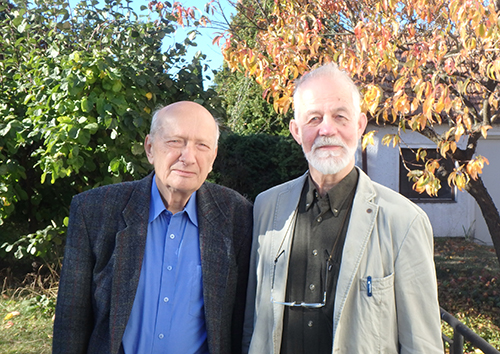Interview: Dietrich Stoyan
Elja Arjas kindly agreed to interview Dietrich Stoyan, a renowned German probabilist, statistician, and an IMS Fellow, who has written an unusual book about his rather unusual life.
Dietrich was born in 1940, at the time when WWII was raging in Europe. He lost his father in the war, and afterwards his mother did not have the financial means to support a family of four children. They lived in the Eastern German province of Saxony-Anhalt, which was occupied by the Russian Forces and later became part of GDR, the German Democratic Republic, established in 1949. After university studies in Dresden, Stoyan became lecturer in the small Bergakademie Freiberg university, governed under the strict control of the communist party of the GDR. He was an outsider to this system, or even a dissident. But then came the dramatic change (in German, die Wende): In 1989 the Berlin wall was taken down, and the following year GDR disappeared from the map of Europe. It also brought a big change to Stoyan’s life personally: he became the Rector (president) of Bergakademie Freiberg. Stoyan’s book, originally written in German, documents all this, and it was recently translated into English.
I met Dietrich Stoyan for the first time in 1988 in East Berlin, when he delivered the Opening Lecture at the European Meeting of Statisticians (EMS), for which GDR was then the host country, and I was Program Chair. Stoyan and I met again recently in his home town, Freiberg, and had lunch together. I put many questions to him relating to his book, and to his life more generally, which he answered. Here is a small sample of the many topics we discussed:
EA: Why did you write this book?
DS: I have led an interesting life, during interesting times. There are many stories to tell about events which may be hard to believe but which are real and often funny. An example, described in the book, is my attempts at correspondence with Wiley in the context of writing a review of a book by Peter Hall, by using letters, a post card and even a telegram. I can relate such events still now in detail because I kept a diary. But the book also shows how a scientist who was not active in university management issues suddenly changed his mind, transforming himself from a passive and even negative outsider to an activist and leader.
EA: How did the communist regime influence your possibilities for scientific work?
DS: First, I must say that it generously financed my education, including university studies, and the same was true for my three siblings. But later, in my professional work, it did not give me the freedom a scientist needs. In short, academic life in the GDR was life under a dictatorship. Important books and journals were only available in very limited numbers, or not at all, in the whole country. Travel to the West would have required a special exit visa, from which privilege I was excluded because I was not a member of the SED, the communist party. Today, unfortunately, this situation may still be similar in many countries of the world.
EA: I notice that almost all your publications, including the many books you have written, are in English. Am I right in assuming that this was not a standard solution in your scientific environment in the mid 1970s, and that it required a great deal of additional effort from you?
DS: I did not learn English at school, and only studied it later as a university student, trying then to practice my skills by writing papers and reviews for the Zentralblatt of Mathematics. In part for this reason, giving the Opening Lecture at the EMS in 1988 was a major challenge for me. But I had great helpers in writing my books (Daryl Daley and Wilfrid Kendall), and at an early stage I was encouraged by Tomasz Rolski. Fortunately, I understood early enough that I can survive as a scientist only by writing in English.
EA: Your book ends with a description of how your portrait, in the full traditional attire of the Bergakademie Rector, was painted in oil by a famous artist. Given all these experiences in your life—sometimes difficult, but also exciting—would you agree with the view expressed in the title of Shakespeare’s play, “All’s Well That Ends Well”?
DS: Absolutely!
Dietrich Stoyan’s book, In Two Times: A former East German scientist tells his story of life in two Germanies is available from Amazon.

Comments on “Interview: Dietrich Stoyan”